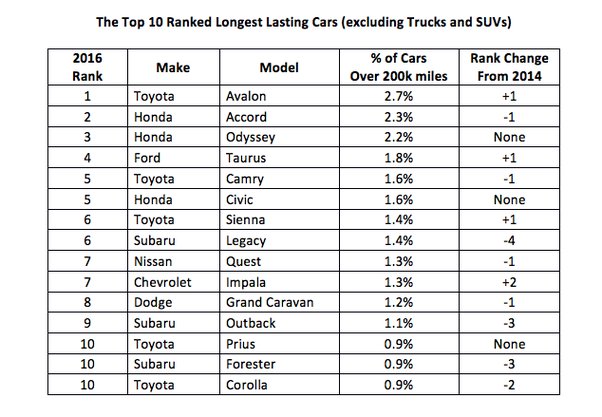Good Used Car Brands: Your Ultimate Guide to Smart Second-Hand Buys
Good Used Car Brands: Your Ultimate Guide to Smart Second-Hand Buys cars.truckstrend.com
Buying a used car can be one of the smartest financial decisions you make, offering significant savings compared to buying new. However, the world of pre-owned vehicles can also be a minefield of potential problems if you don’t know what to look for. This is where understanding "Good Used Car Brands" becomes paramount. It’s not just about finding a cheap car; it’s about identifying brands that consistently deliver reliability, durability, and value long after their first owner drives them off the lot. A good used car brand promises fewer headaches, lower long-term costs, and a vehicle that holds its value, ensuring your investment pays off for years to come.
This comprehensive guide will walk you through what makes a used car brand truly good, highlight the top contenders in the market, provide actionable advice on how to make a smart purchase, and address common questions to empower your next car-buying journey.
Good Used Car Brands: Your Ultimate Guide to Smart Second-Hand Buys
What Makes a Used Car Brand "Good"?
Not all car brands are created equal, especially in the used market. Several critical factors contribute to a brand’s reputation as a "good used car brand":
- Reliability & Durability: This is arguably the most important factor. A good used car brand produces vehicles that are built to last, with components that withstand years of use without premature failure. This translates to fewer unexpected repairs and lower maintenance costs over time.
- Low Cost of Ownership: Beyond the initial purchase price, consider fuel economy, insurance costs, and the expense of routine maintenance and parts. Brands with readily available, affordable parts and simple engineering often have lower overall running costs.
- Strong Resale Value: Vehicles from reputable brands tend to depreciate slower, meaning they retain a higher percentage of their original value. This is beneficial if you plan to sell or trade in the car down the line.
- Availability of Parts and Service: Popular brands typically have widespread dealer networks and independent mechanics familiar with their models, making service and repairs more convenient and often more affordable. Aftermarket parts are also usually plentiful.
- Positive Owner Satisfaction: Real-world experiences from current and previous owners are invaluable. Brands with high owner satisfaction scores often indicate a reliable, enjoyable, and trouble-free ownership experience.
- Safety Ratings: A good used car brand prioritizes safety, with models consistently achieving high scores in crash tests from organizations like the NHTSA (National Highway Traffic Safety Administration) and IIHS (Insurance Institute for Highway Safety).

Top Contenders: Brands Known for Reliability and Value
When it comes to consistently performing well in the used car market, a few brands repeatedly rise to the top due to their commitment to quality and owner satisfaction.
The Unrivaled Japanese Giants: Toyota, Honda, Mazda, Subaru, Lexus, Acura

These brands are almost synonymous with reliability and longevity, making them perennial favorites in the used car market.
- Toyota: Consistently ranks at or near the top for reliability. Models like the Camry, Corolla, RAV4, and Highlander are renowned for their bulletproof engines, durable transmissions, and minimal unscheduled maintenance. They hold their value exceptionally well.
- Honda: Another titan of reliability, Honda vehicles offer a balance of fuel efficiency, engaging driving dynamics, and excellent build quality. The Civic, Accord, CR-V, and Pilot are popular choices known for their longevity.
- Mazda: Often praised for their "zoom-zoom" driving experience, Mazda has significantly improved its reliability ratings in recent years. Models like the Mazda3, Mazda6, and CX-5 offer a premium feel, good fuel economy, and solid dependability without the premium price tag.
- Subaru: Known for their standard all-wheel-drive (AWD) systems, Subarus like the Forester, Outback, and Crosstrek are favored for their safety, go-anywhere capability, and impressive resale value, particularly in colder climates. While some older models had head gasket issues, newer ones are very reliable.
- Lexus (Toyota’s Luxury Arm): If you’re looking for luxury without the typical luxury car maintenance headaches, Lexus is an excellent choice. Models like the ES, RX, and IS offer supreme comfort, refined performance, and the legendary reliability of their Toyota underpinnings.
- Acura (Honda’s Luxury Arm): Similar to Lexus, Acura provides a more upscale experience with Honda’s reliability. The MDX, TLX, and RDX are known for their performance, advanced features, and strong dependability.

The Ascending Korean Stars: Hyundai, Kia
Once seen as budget alternatives, Hyundai and Kia have made incredible strides in quality, design, and reliability over the last decade, making them highly attractive used car options.
- Hyundai: Offers excellent value, modern features, and impressive warranty coverage (though the full factory warranty typically only transfers to the second owner for 5 years/60,000 miles). The Elantra, Sonata, and Tucson are reliable, well-equipped choices.
- Kia: Shares platforms and engineering with Hyundai, offering similar benefits. The Forte, Optima, and Sportage provide stylish designs, generous features, and strong reliability at competitive used prices.
Select American & European Contenders (with Caveats)
While Japanese and Korean brands often dominate reliability rankings, certain American and European brands offer good used car value in specific segments, though often with more model-specific research required.
- Ford: While not all Ford models are universally reliable, their trucks and some SUVs, like the F-150 and Explorer, can be very durable, especially with good maintenance. Parts are plentiful and often affordable.
- Chevrolet: Similar to Ford, certain Chevy models, particularly the Silverado truck and the Tahoe/Suburban SUVs, are known for their robust build and longevity.
- Volkswagen: Known for their German engineering and driving dynamics, VWs like the Jetta and Passat can be reliable, but specific model years and proper maintenance history are crucial. Repair costs can be higher than Japanese counterparts.
- Volvo: Renowned for safety and solid build quality, Volvo sedans and SUVs (e.g., S60, XC60, XC90) are durable and comfortable. However, parts and specialized repairs can be more expensive.
How to Identify a Good Used Car from a Reputable Brand
Even within a "good" brand, individual cars can vary. Here’s how to ensure you pick a winner:
- Research Specific Models and Years: Not all models from a good brand are equally reliable. Use consumer reports, reliability surveys (e.g., J.D. Power, Consumer Reports), and owner forums to pinpoint the best years and trims for your chosen model.
- Obtain a Vehicle History Report (VHR): Services like CarFax or AutoCheck provide crucial information about a car’s past, including accident history, previous owners, service records, and title issues. This is non-negotiable.
- Schedule a Pre-Purchase Inspection (PPI): Have an independent, trusted mechanic thoroughly inspect the vehicle before you buy it. They can identify hidden problems that even a VHR might miss, saving you thousands in future repairs.
- Thorough Test Drive: Drive the car on various road types (city, highway, bumps). Pay attention to strange noises, steering feel, braking performance, and how the transmission shifts. Test all features: A/C, radio, windows, lights, etc.
- Check for Recalls: Verify if the car has any open safety recalls that haven’t been addressed. You can do this on the NHTSA website with the VIN.
- Review Maintenance Records: A car with a consistent service history is a strong indicator of a well-maintained vehicle, regardless of mileage.
Important Considerations When Buying Used
- Set a Realistic Budget: Beyond the purchase price, factor in potential repairs, insurance, registration, and fuel costs.
- Mileage vs. Age: A car with higher mileage but newer age (e.g., 80,000 miles on a 3-year-old car) might indicate a lot of highway driving, which can be less stressful on the engine than city driving. Conversely, a very old car with low mileage could have issues from sitting too long.
- Dealership vs. Private Seller:
- Dealerships: Offer convenience, financing options, and often Certified Pre-Owned (CPO) programs with warranties. Prices might be higher.
- Private Sellers: Potentially lower prices as there’s no markup, but "as-is" sales mean more risk and less recourse if issues arise.
- Certified Pre-Owned (CPO) Programs: Offered by dealerships for specific brands, CPO vehicles undergo rigorous inspections and come with extended warranties. They cost more than non-CPO used cars but offer peace of mind.
- Negotiation: Always be prepared to negotiate the price. Research market values for similar vehicles beforehand.
Potential Challenges and Solutions
- Hidden Damage or Mechanical Issues:
- Solution: A comprehensive Pre-Purchase Inspection (PPI) by an independent mechanic is your best defense.
- Fraudulent Sellers or Title Washing:
- Solution: Stick to reputable sellers (dealerships, trusted private parties). Always get a Vehicle History Report (VHR) and verify the VIN on the car matches the title.
- Higher Maintenance Costs (for certain brands/models):
- Solution: Research the average cost of parts and common repairs for specific models before buying. Japanese and Korean brands generally have lower maintenance costs.
- Limited Availability of Desired Models/Trims:
- Solution: Be patient and broaden your search radius. Use online car marketplaces and set up alerts for new listings.
Good Used Car Brands: Representative Price Ranges (Example Models)
Please Note: These are highly generalized price ranges for typical used models (e.g., 3-7 years old, average mileage) and can vary wildly based on year, mileage, condition, trim level, location, and market demand. This table is for illustrative purposes only.
| Brand (Category) | Typical Models (Example) | Typical Used Price Range (USD) | Key Benefit (Used) |
|---|---|---|---|
| Toyota (Japanese) | Camry, Corolla, RAV4, Highlander | $15,000 – $35,000+ | Legendary reliability, high resale, low running costs |
| Honda (Japanese) | Civic, Accord, CR-V, Pilot | $14,000 – $32,000+ | Balanced performance, fuel efficiency, durable |
| Mazda (Japanese) | Mazda3, CX-5, Mazda6 | $12,000 – $28,000+ | Engaging drive, premium feel, improved reliability |
| Subaru (Japanese) | Forester, Outback, Crosstrek | $16,000 – $33,000+ | Standard AWD, safety, strong resale value |
| Lexus (Luxury) | ES, RX, IS | $20,000 – $45,000+ | Luxury, comfort, Toyota reliability |
| Acura (Luxury) | MDX, TLX, RDX | $18,000 – $40,000+ | Sporty luxury, Honda reliability |
| Hyundai (Korean) | Elantra, Sonata, Tucson, Santa Fe | $10,000 – $25,000+ | Excellent value, modern features, improving quality |
| Kia (Korean) | Forte, Optima, Sportage, Sorento | $10,000 – $25,000+ | Stylish design, good features, strong warranties |
| Ford (American) | F-150, Explorer, Escape | $15,000 – $40,000+ | Durability in trucks/SUVs, parts availability |
| Chevrolet (American) | Silverado, Equinox, Tahoe | $15,000 – $40,000+ | Robust trucks/SUVs, widespread service network |
| Volkswagen (Euro) | Jetta, Passat, Tiguan | $10,000 – $22,000+ | German engineering, driving dynamics (research years) |
| Volvo (Euro) | S60, XC60, XC90 | $18,000 – $38,000+ | Top-tier safety, strong build quality |
Frequently Asked Questions (FAQ)
Q1: What’s the "best" mileage for a used car?
A1: There’s no single "best" mileage. A car with 100,000 highway miles might be in better shape than one with 60,000 city miles. Focus more on consistent maintenance records, the car’s overall condition, and a pre-purchase inspection than just the odometer reading.
Q2: Is it better to buy a used car from a dealer or a private seller?
A2: Dealers offer convenience, financing, and often CPO options with warranties, but typically at a higher price. Private sellers often have lower prices, but sales are usually "as-is," with less recourse if issues arise. For first-time buyers or those seeking peace of mind, a reputable dealer or CPO program might be preferable.
Q3: What is a Certified Pre-Owned (CPO) car?
A3: A CPO car is a used vehicle sold by a franchised dealership that has undergone a rigorous multi-point inspection and reconditioning process to meet manufacturer standards. CPO cars typically come with an extended warranty, roadside assistance, and other benefits, offering more peace of mind than a standard used car.
Q4: How important is a vehicle history report (VHR)?
A4: Extremely important. A VHR (like CarFax or AutoCheck) provides a crucial glimpse into a car’s past, including accident history, title issues (salvage, flood), service records, and number of owners. It’s a vital tool for avoiding problematic vehicles.
Q5: Should I always get a pre-purchase inspection (PPI)?
A5: Absolutely. A PPI by an independent, trusted mechanic is the single most important step in buying a used car. It can uncover hidden mechanical issues, signs of accident damage, or deferred maintenance that could cost you thousands down the line.
Q6: Which used car brands are generally the cheapest to maintain?
A6: Historically, Toyota and Honda have been the leaders in low maintenance and repair costs due to their reliable engineering and readily available, affordable parts. Hyundai and Kia are also becoming very competitive in this regard.
Q7: Are luxury brands good used cars?
A7: Some, like Lexus and Acura, are excellent used choices due to their underlying reliability from Toyota and Honda, respectively. Others, particularly some German luxury brands, can offer a fantastic driving experience but often come with significantly higher maintenance, repair, and parts costs as they age. Research specific models and be prepared for potential higher upkeep.
Conclusion
Navigating the used car market can be a rewarding experience, leading to substantial savings and a reliable vehicle. By focusing on "Good Used Car Brands" – those consistently praised for their reliability, durability, and value retention – you significantly increase your chances of a successful purchase. Remember that even the best brands have individual vehicles that might not be perfect. Therefore, combining brand knowledge with thorough research, a comprehensive vehicle history report, and a crucial pre-purchase inspection will empower you to make an informed decision and drive away with confidence in your new-to-you car. Happy hunting!






